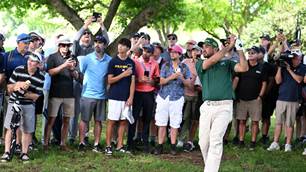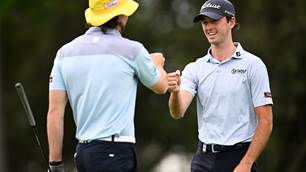Justin Morris is a man whose cycling life is all about the stories he gets to tell at the end of the ride – and boy, does he have some great ones already in the bag.
Morris has been a professional in both road racing and mountain biking, competed in America as well as in Australia, survived the infamously brutal 10-day Crocodile Trophy event in northern Queensland (twice), ploughed through 700 sand dunes to win the epic 600km-long Simpson Desert Challenge and has also climbed the equivalent of Mount Everest (8,848m) in just 15 hours riding up and down Mt Kaputar in New South Wales.
As if all that was not amazing enough, he’s done it while dealing with Type 1 diabetes which means he’s in serious danger of dying if his blood-sugar levels are not properly managed.
“I love doing things like riding across the Simpson desert, or the Crocodile Trophy or Everesting up Mount Kapitur. Those kind of events that are a bit different from normal are a real spectacle - and spectacles make really good stories,” Morris says.

“I have a responsibility as an ambassador for Type 1 diabetes to share good stories and inspirational stories with other people living with the condition and doing things like that captures people’s imagination.
“Those events are also a good metaphor for living with the challenges of Type 1 diabetes.
“For example, the Crocodile Trophy was 10 days long and painful. It was very, very, very difficult. But I got through it, I finished on the podium, I conquered all the challenges that were thrown at me. It’s the same as living with Type 1 diabetes; it’s painful, it’s hard, but you will get through it.”
“During the Crocodile Trophy I felt so much pain that I considered never getting on a bike ever again – but now I don’t feel that pain at all. I just get to travel round the world and brag to people about it. The short-term pain was worth it for the long-term gain.”
He started competing seriously in mountain bikes at the age of 14, then moved onto road bikes five years later for training purposes and by 2009 had been signed up as a pro for the MACE/Wilson Racing team in Australia’s top level domestic series. Up until that point, though, he kept his diabetes totally secret from other riders – not wanting to attract any attention for having medical issues.

“At that time, I don’t think most of the people I rode with would have had a clue that I had diabetes. My close friends did, but other than that I kept it to myself,” he says.
“I didn’t like to talk about it, I didn’t want to feel different, so I just kept it to myself which made it very difficult sometimes.”
However, his team manager was aware that Morris was diabetic and soon put him in touch with Team Type 1 (now rebranded as Team Novo Nordisk) – an amazing professional set-up based in USA whose squad is filled entirely with riders with the condition.
And so he packed his bags and moved to America, which was not only the start of a new racing career – but also the spark for his passion to spread the message about Type 1 diabetes and how people do not have to be constricted by it.
“When I joined Team Type 1, I started to accept my own illness a bit more and to talk about it a bit more. And subsequently my management of my own diabetes got a lot better,” he explains.
“Professional road cycling is hard yakka and anyone who has been through it would tell you that. I would not have been a professional if it wasn’t for Team Type 1. Having that extra purpose helped me to push through the suffering. If you have some kind of purpose and some kind of meaning behind all the pain you are experiencing, it makes you more motivated to push through all that and deal with it.
“I don’t think I would have had the strength and fortitude to push through all the bullshit and all the hours and hours of training on the bike. I would have struggled to find the purpose behind it all if I was riding for a team that was just selling computer games or TV screens or whatever.
“But going out to speak to people about diabetes when we were at races gave me a tangible reminder of the purpose of what we were doing. You go to an event and you speak about the team, and your own journey about living with diabetes and how you faced all the challenges you’ve had. You see the hope and how inspired people are by hearing that it is possible to race bikes, it is possible to travel the world, it is possible to do whatever you dream about while also living with Type 1 diabetes,” he adds.
“Seeing other people realise that means a lot to me and it motivated me for a long time.”

The most humbling experience of his role as inspirational speaker to other people with Type 1 diabetes came when Morris was competing in the UCI’s Tour du Rwanda in 2012.
The trip opened his eyes to the fact that he had actually been very lucky to be diagnosed with the condition in a country where getting access to insulin was not a concern.
“Going to Rwanda and racing there brought me right back down to earth,” Morris says. “I now speak to people in Australia and I tell them they can do anything and live their dreams because I know for them it is possible. We have a good healthcare system, we have a good support system for people living with Type 1 diabetes. We have all the resources available to us.
“But in Rwanda, you realise pretty quickly that’s not the case. Getting to meet the diabetes community there, and seeing what they deal with each day, made me motivated to help some of the organisations trying to give support to places like that. You suddenly realise there are a lot of people around the world living with Type 1 diabetes where daily life is still a huge struggle. It’s a huge struggle to get the life-saving medicine they need.”
While trips to Rwanda - and Russia and Korea and China – while competing with his professional team were certainly enlightening, there was also plenty to be learnt in his new base in Michigan.
 The move to America – he was based out of Traverse City around 410km north-west of Detroit – gave Morris a great appreciation of the differences in cycling cultures between the United States and his homeland of Australia.
The move to America – he was based out of Traverse City around 410km north-west of Detroit – gave Morris a great appreciation of the differences in cycling cultures between the United States and his homeland of Australia.
Most notably, it gave him the chance to live life as a minor celebrity on the USA circuit - which mainly involved short, sharp criterium races in big cities across the country.
“What I loved about racing in America is that the crits are run in the downtown areas of the city and they are very well publicised and promoted and you get these huge crowds,” Morris says. “There can be 20,000 people lining the streets and cheering and it’s really cool. It brings the community together and it makes a real event of it. In Australia, a lot of the domestic level races are in very small country towns and you might get a couple of school kids at the finish line.
“One thing that was cool in America was that as a cyclist and a professional athlete, people really respected you. When you mentioned what you did as a job, the people were excited by it and interested in it. They wanted to know more.
“In Australia we have more of a tall poppy syndrome. The nail that pokes up too high gets hammered down pretty soon, so you tend to be a bit more modest in Australia. In America, though, you can pretend you’re a real celebrity and milk it for all it’s worth and that was kind of cool.”
“In Europe you really notice that bike riding is just a part of the culture. There is never an issue with motorists and there is always somewhere good to ride. In Belgium and France, especially, cycling is pretty much the biggest sport after soccer. People worship cyclists,” he explains.
“I was lucky where I lived in America because Traverse City is a beautiful part of the world. It was great for bike riding. There were so many roads with no cars, whereas here in Sydney for example you are always fighting a losing battle against all the traffic.
“But equally, I couldn’t imagine riding a bike if I’d have been in New York City or Los Angeles or something like that.”
Due to his diverse cycling career, Morris is also perfectly placed to offer an opinion on the pros and cons of both road cycling and mountain biking.
Since he retired from pro racing in USA in 2014 he has largely focused on those ‘big story’ events in Australia, which are predominantly set up for off-roaders. The 30-year-old admits that mountain biking was always his first love, but believes road cycling also offers something that can’t generally be found while going cross-country or downhill.

“To be perfectly honest, I always preferred mountain biking to road cycling," he explains.
“Mountain biking as a sport is honest – you clip in, you go hard and, unless you have some kind of mechanical, the strongest and best rider on the day will win the race. I like that about mountain biking and it’s what still draws me to it.
“In road racing there are a lot of tactics that come into it, you have to be cunning. It’s a lot more of a mind game rather than just a strength game. But the fact of the matter is that in road racing there is a lot more money. It’s much more possible to get a job as a professional – very, very few mountain bikers can earn enough money just to live off their sport.
“On the other side, the thing I like about road cycling - especially living in Sydney - is that I roll out of my driveway and I’m in the sport and I can just ride. There are some beautiful places to go and you can cover a lot more ground and get to some amazing places. In mountain biking, unless you live right next door to the tracks, you have to drive to the trails or ride your bike on the roads which is not much fun," he adds.
“Road racing is also a team sport – and that’s the one thing that kept me in it and kept me motivated. You get to work with people and develop a camaraderie with your team-mates. That’s the beautiful side of road racing. You absolutely bust your ass for someone else. You might not be the one on the top of the podium or getting the King of the Mountains jersey, or whatever it is, but you can still feel satisfied with what you’ve done during the day – even if you end up finishing last. Everyone has a role and everyone in the sport understands that, even if people watching on TV maybe don’t so much.”
Morris readily admits that for most of his professional racing career he was simply slogging away at the back of the pack, trying to do a job for the team rather than celebrating much personal glory, kissing the podium girls or spraying the champagne.
Which is perhaps why he enjoyed the gruelling Simpson Desert Challenge in 2016 a bit more than he might otherwise.
Despite 600km of sand, heat and isolation across a barren landscape right in the middle of Australia, Morris was smiling all the way as he won every competitive stage to claim the overall trophy – although the silverware itself never leaves the iconic Birdsville Hotel which marks the end of the remarkable race.
“I’ll be the first to say – the Simpson Desert race is not a professional race with all the best cyclists from around the world involved,” he jokes. “But being there and being the dominant rider was a good change for me! I spent 17 years as a bike racer suffering like a dog, especially when I was a professional. I’ll be honest, as a pro I was at the back most of the time and suffering just to hang in there. So to be in a situation where I was at the front of the pack and winning, it was a nice change.
“I love the sport and I love riding. It brings me a lot of joy and puts a smile on my face. Some professional cyclists end their career and then never touch a bike again in their life – but I still love it and still try to ride every day. I want to keep trying to create stories that I can talk about."
Which begs the obvious question – what is the next story to be told?
Morris explains: “I am doing The Pioneer with MarathonMTB in February. That’s a seven-day, 550km race from Christchurch to Queenstown in New Zealand. And there is also the Mongolia Bike Challenge in August which goes for seven days through pretty arid, pretty amazing geography. So I think that will be a spectacle and a great story."
Related Articles

If the game is for the fans, let them follow the players

Elvis may not be The King. But Next Big Thing? Look out













